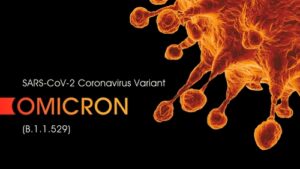Posted by: Maryland ENT in General
There’s no doubt that everything surrounding COVID-19 keeps evolving and changing, including its symptoms. There are various reasons why COVID-19 symptoms keep changing.
Like any other virus, the SARS-CoV-2 virus that causes COVID-19 is evolving in the way it spreads, infects people, and the symptoms it presents. Part of its evolution is that the younger population has different and less severe symptoms in most cases.
There’s also evidence that being vaccinated can lead to experiencing less severe symptoms. Patients have more unusual symptoms with the latest variant, Omicron, because of a shift in infecting the respiratory tract.
Experts suggest that Omicron infects the throat before infecting the nose, while previous variants started with the nasal passage. When it comes to COVID-19 and sinus infections, many patients who test positive for the Omicron variant are reporting less intense upper respiratory symptoms like sinus congestion, headache, and sore throat.
You may even mistake some of these symptoms for a sinus infection, making it more challenging to know the difference between the two. Keep reading to learn why COVID-19 sinus symptoms continue evolving.
The Omicron Variant

The Omicron variant has overtaken the Delta variant and now accounts for most of the COVID-19 cases in the United States. Although Omicron typically causes a less severe disease than Delta, it’s incredibly infectious.
Omicron remains highly transferable, even among those who have received vaccines. It’s more contagious than other variants that formerly dominated the world.
Many people have become sick from Omicron, with some getting seriously ill. The early warning signs of Omicron include:
- Fatigue
- Scratchy throat
- Headache
- Body aches
- Sneezing
- Lower back pain
- Night sweats
- Nasal congestion or runny nose
Bear in mind that some people are asymptomatic carriers, meaning they don’t have any symptoms. Others might suddenly suffer organ failure and need to go to a hospital to be put on a ventilator.
Regarding Delta and Omicron, the previous characteristics of COVID-19 such as coughing, loss of smell or taste, and fever are not as typical with the Omicron variant. Researchers reveal that Omicron is almost four times more contagious than Delta in those vaccinated and those that received boosters.
There isn’t a notable difference in infection rates among those not vaccinated. Smell and taste are the significant differences between the Delta and Omicron variants.
Data shows that loss of taste and smell is more prevalent in those who had Delta than people who tested positive for Omicron. If you’ve lost your sense of taste or smell, or you’ve seen a change in these senses, these are most likely signs of having the Delta variant.
Sinus Infections

A sinus infection happens when certain viruses or bacteria cause inflammation and mucus buildup in your sinuses. Your sinuses are the hollow, air-filled spaces found on your forehead, under your eyes, and behind your cheeks.
Sinus infections usually occur due to the virus that causes the common cold. It’s also not unusual for a viral sinus infection to become bacterial ten days after a viral infection starts.
The symptoms of a sinus infection can vary slightly based on the cause.
Common signs of a sinus infection include:
- Reduced or loss of sense of smell
- Sore throat
- Facial pressure or pain
- Nasal congestion
- Headaches
- Tooth pain
- Nasal drainage
Shared Symptoms Between COVID-19 and Sinus Infections

As with COVID-19, you can develop a sinus infection at any time of the year. However, sinus infections tend to flare up during the flu and cold season.
Both sinus infections and COVID-19 viruses spread when an infected person coughs or sneezes. If they get into your mouth, nose, and eyes, you can catch both viruses.
A person can also be infected if they come into contact with someone who’s sick or touches a contaminated surface and then touches their mouth, eyes, or nose. There are several symptoms that viral and bacterial sinus infections share with COVID-19.
Having a stuffy or runny nose was usually a sign of a sinus infection. That isn’t the case anymore.
Today, nasal congestion and a runny nose are symptoms of the most prevalent COVID-19 variant, Omicron. Other COVID-19 symptoms similar to a sinus infection are headaches and sore throat.
Differences Between COVID-19 and a Sinus Infection
Losing your sense of smell is no longer expected with Omicron. If you’ve lost your sense of smell or noticed a change in how you can smell, you might have a sinus infection.
COVID-19 is more likely to cause severe respiratory infections such as pneumonia or even death than a sinus infection.
How To Protect Yourself and Others From COVID-19 and Sinus Infections

With COVID-19 cases still soaring, the main precautions for preventing its spread remain the same. Because of how sinus infections and COVID-19 viruses spread, the following steps can help lower your risk of getting COVID-19 or a sinus infection:
- Avoid gatherings when possible
- Get vaccinated against COVID-19 if you haven’t been already
- Self-isolate if you’re feeling sick and symptomatic beyond the recommended time frame: about 5 to 7 days. Experts also recommend you get tested for COVID-19 out of caution if you continue feeling sick regardless of whether you show any possible symptoms or don’t have any.
- Ensure you practice social distancing and wear higher-quality face masks like the KN95.
- If you’re eligible, get boosted. COVID-19 booster shots increase protection against symptomatic and asymptomatic infection. This minimizes the transmission of the virus. What’s more, boosters protect against severe disease.
- Wash your hands regularly and thoroughly.
- Cover your nose and mouth whenever you sneeze or cough. Use a tissue and throw it away immediately; cough or sneeze into your elbow if you don’t have a tissue.
- Disinfect frequently touched surfaces like light switches and doorknobs.
Do You Think You Have a Sinus Infection?
If you think you have a sinus infection, the team at Maryland ENT Center can help. We’ll discuss your symptoms and guide you in taking the next best steps.
If you believe you have a sinus infection, we’ll provide a highly customized and effective treatment plan to bring you long-term relief. Schedule an appointment at Maryland ENT Center in Baltimore and Lutherville, MD, today!



